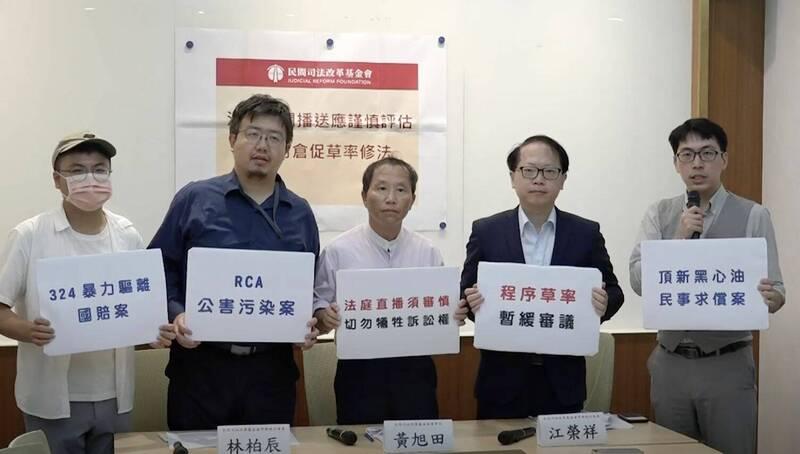The Judicial Reform Foundation and other civil groups today called on lawmakers to postpone deliberation of an amendment that would allow live broadcasts of courtroom proceedings, as the variety in types of litigation risks infringing on the rights of involved parties.
Opposition lawmakers last month submitted the draft amendment of the Court Organization Act (法院組織法) directly to a second reading.
The foundation held a news conference at the Legislative Yuan today, issuing a joint statement together with 17 other civil society groups including Covenants Watch and the Awakening Foundation.

Photo courtesy of the Judicial Reform Foundation
Although broadcasting court proceedings could increase the transparency and openness of the judicial system, they said they are concerned about the amendment being rushed through legislative procedures.
In terms of protecting the people’s right to litigation and the defendant’s right to a fair trial, there are some serious flaws in the draft submitted by the Taiwan People’s Party (TPP), the Judicial Reform Foundation said.
It called on the Legislative Yuan to consider the amendment seriously and refrain from forcefully passing a bill without thorough deliberation.
Broadcasting court proceedings could bridge the gap between the judiciary and the public, and enhance public understanding and trust in the legal system, it said.
However, it is important to promote this policy prudently to ensure it does not infringe upon the rights of the parties involved, it added.
The foundation said that legislation of open court proceedings needs to ensure that all parties involved receive a fair trial.
Related practices vary across foreign legal systems and need to be evaluated, the foundation said.
Taiwan needs to be cautious about broadcasting court proceedings, as there are many kinds of litigation and this would have far-reaching impacts if implemented across the board, it added.
The TPP has hastily handled the legislative process for this amendment, which needs to be thoroughly discussed, the foundation said, urging the review be postponed.

Taiwan is to commence mass production of the Tien Kung (天弓, “Sky Bow”) III, IV and V missiles by the second quarter of this year if the legislature approves the government’s NT$1.25 trillion (US$39.78 billion) special defense budget, an official said yesterday. Commenting on condition of anonymity, a defense official with knowledge of the matter said that the advanced systems are expected to provide crucial capabilities against ballistic and cruise missiles for the proposed “T-Dome,” an advanced, multi-layered air defense network. The Tien Kung III is an air defense missile with a maximum interception altitude of 35km. The Tien Kung IV and V

The disruption of 941 flights in and out of Taiwan due to China’s large-scale military exercises was no accident, but rather the result of a “quasi-blockade” used to simulate creating the air and sea routes needed for an amphibious landing, a military expert said. The disruptions occurred on Tuesday and lasted about 10 hours as China conducted live-fire drills in the Taiwan Strait. The Civil Aviation Administration (CAA) said the exercises affected 857 international flights and 84 domestic flights, affecting more than 100,000 travelers. Su Tzu-yun (蘇紫雲), a research fellow at the government-sponsored Institute for National Defense and Security Research, said the air

Trips for more than 100,000 international and domestic air travelers could be disrupted as China launches a military exercise around Taiwan today, Taiwan’s Civil Aviation Administration (CAA) said yesterday. The exercise could affect nearly 900 flights scheduled to enter the Taipei Flight Information Region (FIR) during the exercise window, it added. A notice issued by the Chinese Civil Aviation Administration showed there would be seven temporary zones around the Taiwan Strait which would be used for live-fire exercises, lasting from 8am to 6pm today. All aircraft are prohibited from entering during exercise, it says. Taipei FIR has 14 international air routes and

Taiwan lacks effective and cost-efficient armaments to intercept rockets, making the planned “T-Dome” interception system necessary, two experts said on Tuesday. The concerns were raised after China’s military fired two waves of rockets during live-fire drills around Taiwan on Tuesday, part of two-day exercises code-named “Justice Mission 2025.” The first wave involved 17 rockets launched at 9am from Pingtan in China’s Fujian Province, according to Lieutenant General Hsieh Jih-sheng (謝日升) of the Office of the Deputy Chief of the General Staff for Intelligence at the Ministry of National Defense. Those rockets landed 70 nautical miles (129.6km) northeast of Keelung without flying over Taiwan,